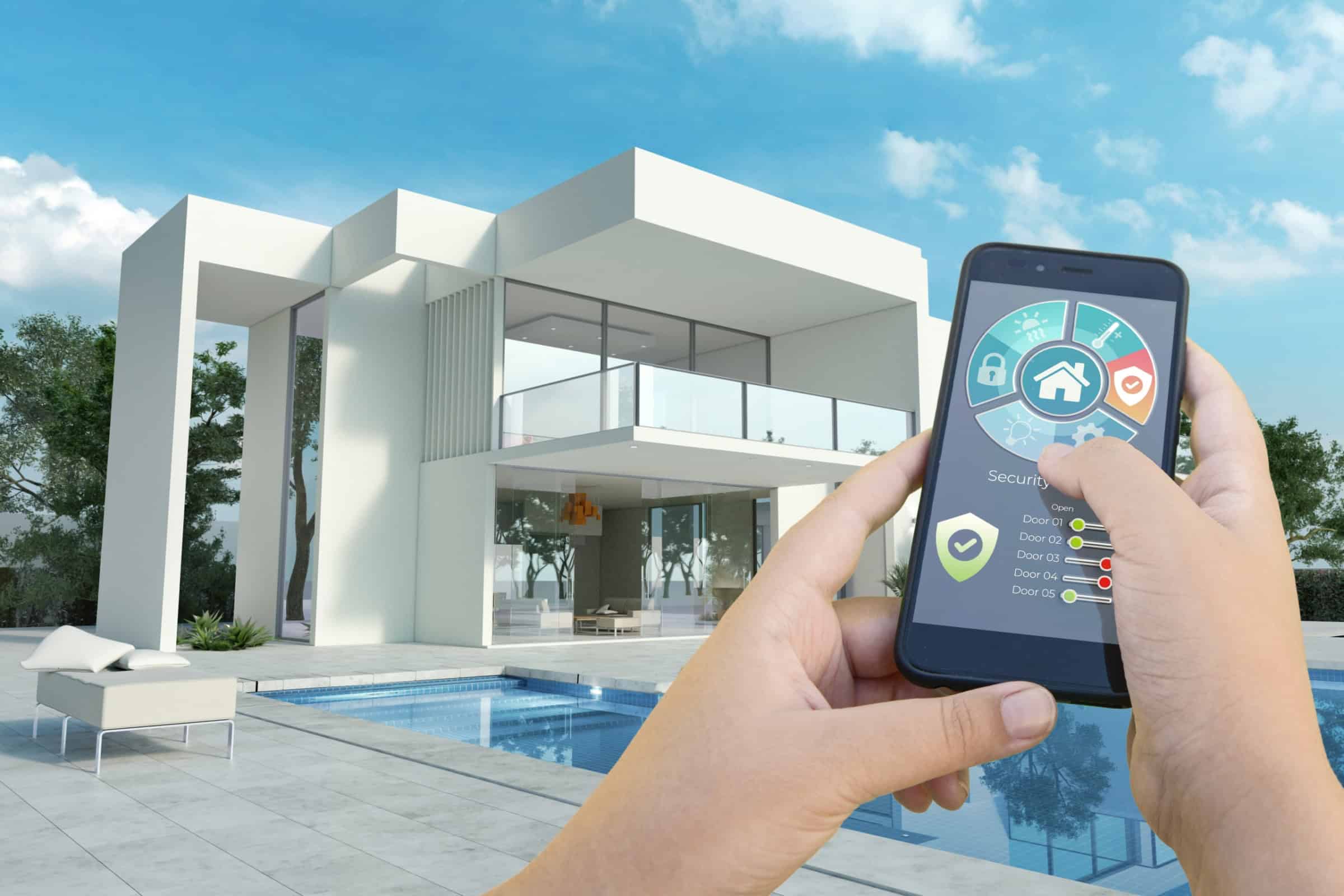Residential security systems provided by a private security company are essential if you want to ensure your home remains safe and secure at all times. However, if you are looking for a comprehensive security system to protect your home in Dubai then you first need to understand the Emirate’s requirements regarding specification, operation and licensing.
Closed-circuit Television (CCTV) and Video Surveillance Systems (VSS)
Closed-circuit television (CCTV) or video surveillance systems (VSS) are critical in maintaining security, law, and order in Dubai, including residential security. The robust CCTV infrastructure, complemented by advanced technology, enables constant surveillance across the city, contributing significantly to Dubai’s reputation as one of the safest cities globally. CCTV cameras in public spaces, residential areas, and commercial establishments deter criminal activities and aid in swift incident resolution. As Dubai propels towards a smart-city model, CCTV systems will play an even more integral role in harnessing the power of real-time data for proactive incident management and urban planning.
Video Surveillance System Specification
Dubai’s Security Industry Regulatory Authority (SIRA) has strict regulations governing VSS specification, installation and monitoring. General VSS regulations apply to residential use.
General Specifications for VSS Systems in Dubai
• Coloured, visible cameras must be used with SIRA approval required for covert or hidden ones; IP66 rating must be provided if camera is placed outdoors; WDR cameras with 110 dB gain ratio are necessary when facing light source
• Recording devices must be digital with three basic functions of live viewing, recording and playback; frame rate should not be less than 25 FPS per camera; copy feature to standard medium format and search tools are a requisite
• Monitors must have size of no less than 21 inches; wall monitors in Control rooms according to the number of cameras; high operational specifications for continuous operation
• Connectors must be safe and away from tampering/unauthorised connection with numbering/naming/labeling at both ends; wireless communication requires prior approval from SIRA
• Private network dedicated only to security systems must be established as well as backup line and network management system for more than 200 devices; compatible with IPv4 and IPv6
• UPS power supply devices connected to recording devices with integrated shut down signal when remaining UPS battery reaches 25%
• VMS software essential in VSS systems with 64+ cameras or 4+ recording devices; passwords/rights levels for control security features ; PSIM use recommended upon approval from SIRA.
Further, more detailed technical requirements depend on whether the VSS system is Analogue or Digital.
Operational Requirements for Residential CCTV in Dubai
Beyond general regulatory requirements for the specification, installation and operation of VSS, access control, alarm and intruder detection systems, SIRA has further specific demands regarding these security systems for certain types of businesses and institutions, including important complexes. Important complexes are defined as clusters of residential or office units, including buildings, towers, and villa compounds.
SIRA has strict operational requirements for VSS in Dubai. The regulator makes the following definitions:
- Camera view: the view captured by the camera and displayed on the monitor
- Target measure: the body view at a scale height of 1.6 meters as represented by a human body or a standard test target
- Pixel density: The calculation of the number of pixels per meter at the target
- Number plate view: The view of the plate number of a vehicle with a size of 330 x 160 mm.
SIRA then has specific specifications and installation requirements depending on the use of the VSS:
- Inspection – studying the facial expressions of people (targets)
- Identification – identifying people (targets) that are not previously identified as they enter an establishment
- Recognition – recognising and following previously identified targets
- Observation – controlling and guiding crowds and gatherings and observing public events
- Detection – detecting key events such as the nature of movement, direction and overall appearance
- Monitoring – detecting the existence of targets without recognition for early warning purposes
- Reading Vehicle Number Plates
Technical Requirements for the Residential VSS System
The following areas in important residential complexes must be covered with fixed VSS systems:
All entrances to the establishment so that a person’s image is to provide identification view;
- All main and secondary emergency exits leading inside or outside the establishment so that a person’s image is to provide identification view;
- All the lobby areas to provide detection view;
- In the elevator lobby so that a person’s image is to provide recognition view;
- All reception areas so that a person’s image is to provide recognition view; Inside elevators to provide recognition view with an angle shows the floor number, and using a lens with a wide angle so that it covers all parts of the elevator;
- All emergency exit doors among floors to provide recognition view;
- The corridors leading to the residential units within detection view;
- All entrances of gyms to provide recognition view;
- All swimming pools to provide detection view;
- All entrances and exits of parking lots to provide view of reading plate numbers
- In the parking drive ways to provide detection view;
- Outdoor cameras in the surrounding area of the building must be installed to provide detection view.
In addition, the VSS recordings must be kept for at least 31 days for all cameras.
A central monitoring system (VideoGuard) must be provided for all buildings, towers and villa compounds unless the buildings are used for housing only, with a total number of units less than 50 residential units.
There are also separate regulations for workers’ residential complexes.
Other Security Systems
Following the surveillance infrastructure, alarm systems in Dubai provide an additional layer of security, making the city’s safety measures even more robust. These sophisticated systems, ranging from home burglar alarms to complex fire alarm systems in commercial buildings, ensure the immediate dissemination of alerts in emergencies. The alarm systems are designed with state-of-the-art technology. They are integrated with the city’s emergency services for rapid response. Moreover, the smart-city vision of Dubai has also influenced the functionality of these alarm systems, incorporating features such as remote access and real-time notifications. As a result, alarm systems and the CCTV network significantly contribute to Dubai’s overall security framework and its standing as a safe metropolis.
Like CCTV/VSS, access control systems and alarm and intruder detection systems must meet the regulatory standards demanded by SIRA.
Access Control Systems
Access control systems must be capable of integration with all fire alarm systems adopted by the Civil Defense, be central, and be able to deal with analogue and digital systems.
Access Control System Regulatory Requirements
Lock mechanisms should open automatically in emergencies and be self-locking. They should have a manual opening function if necessary.
• Acceptable identification methods include PIN Number panel, online/offline ID cards, and biometric readers (fingerprint scanners, retina scanners and vascular network readers). Secret codes are not allowed to be used alone.
• Wireless connections require the consent of SIRA. All cables must be hidden or routed in electrical containment, numbered, labelled, specified on both ends and installed according to cable-type standards.
• Control panels must include a spare battery for four hours’ worth of operation in case of a power failure.
• Management and control software should be compatible with multiple platforms and operating systems; entry/exit login details must be kept for at least one year; an enrolment station is to be set up securely; it should contain an interactive electronic map; full software development kit (SDK) is required for access control system integration with other systems.
Alarm and Intruder Detection Systems
All parts of the system must be Grade-3 as a minimum requirement.
Alarm and Intruder Detection Systems Regulatory Requirements
• Sensors must cover the entire protected area and use dual motion detectors (infrared and microwave), vibration detection, drilling detectors, glass break sensors, and door contacts.
• An audio-visual alarm should be installed with an additional internal power supply (UPS) that will run for a minimum of 8 hours if the power cable is cut.
• All connectors should be hard-wired, numbered, labelled and specified on both ends in accordance with international specifications and standards. Aluminium-coated copper cables and copper-coated steel cables are not allowed.
• The control panel must be approved by SIRA and connected to the central alarm monitoring station; each sensor must be programmed separately on a separate zone.
• Keypad must be installed away from the control panel near entry or exit doors; alarm systems have features for triggering in cases of damage, tampering, removal/disconnection of control panel or failure in power supply.
• Disarm period not to exceed 1 minute; Keyholder must arm system after end of working day/building evacuation & immediately respond to police call upon notification of activation.
Licensing for Residential Security Systems Companies in Dubai
It is important to be aware that not just anyone can specify, supply, install, operate or maintain security systems in Dubai. The requirements provided for in Article (6) of Decree No. (1) of 2018 issuing the executive regulations of Law No. (12) of 2018 on Regulating the Security Industry in Dubai concern issuing licenses for companies and institutions.
Businesses must be licensed to install security devices and equipment. Also, they must provide a security system engineer certified by SIRA and have two security systems technicians certified by SIRA.
If the security system business also conducts technical surveys, then they must have an equipped storage facility or have storage at a SIRA-certified storehouse and comply with specific procedures when conducting technical security surveys.
The control centres of security system operations companies must comply with security specifications and requirements and provide a security systems controller certified by SIRA must 24/7, 365 days per year. In addition, connectivity services to the central control room have their own security specifications and requirements.
Please be aware that if you employ security consulting services then a security consultant or expert certified by SIRA must be provided but the licence holder must not have any other business whose activities include trading in security devices and equipment, or installing security devices and equipment.
More Information on Residential Security in Dubai
Residential security services provided by Hotels in Dubai prioritise the safety of their guests above all else. The city’s hotel industry complies with stringent health…
Read more … Hotel Security in Dubai: Ensuring Safety and Protecting Reputation
If you own a superyacht, it is your residence on the water. Superyacht security is of utmost importance given the high value of these vessels…
Read more … Superyacht Security in Dubai: Safeguarding Luxury on the High Seas



